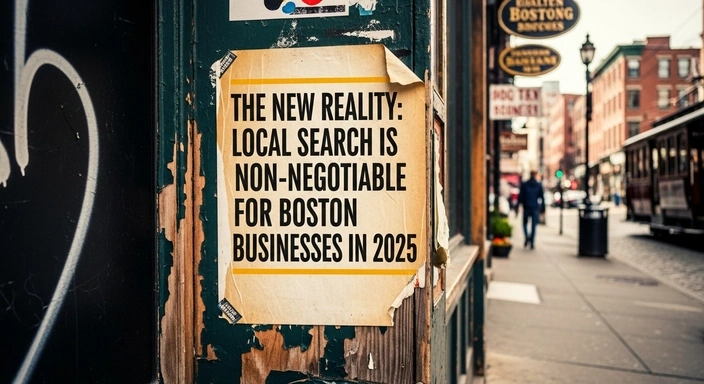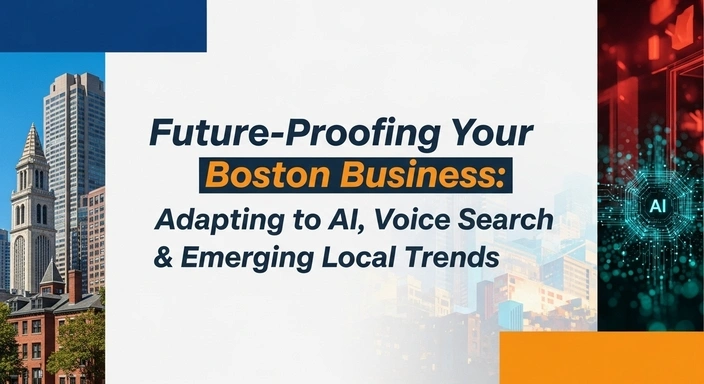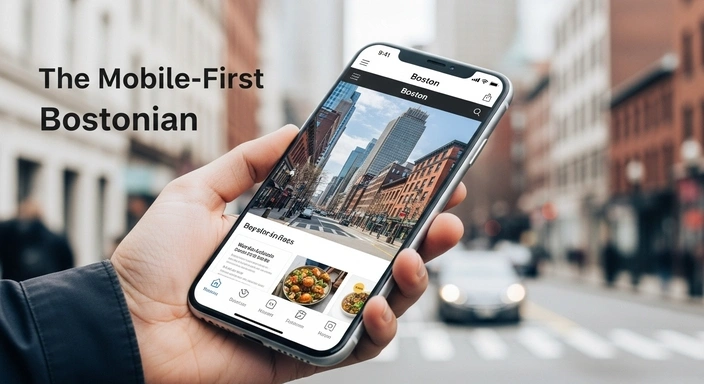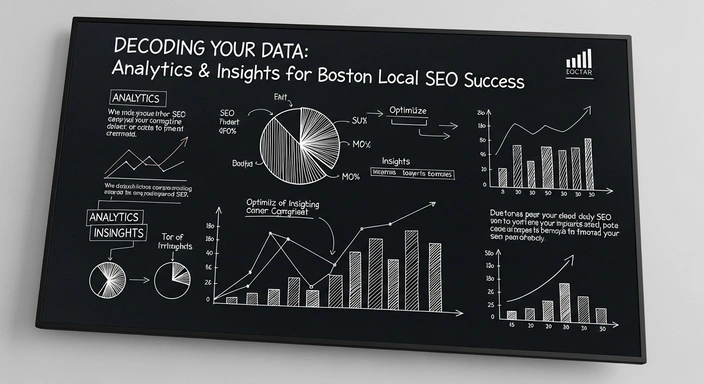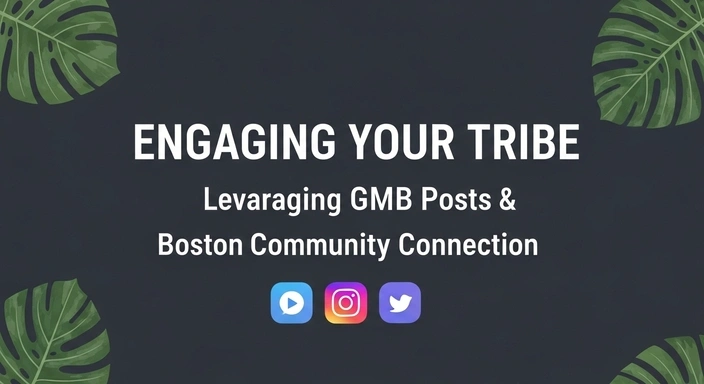This article is the first in our 12-part series: Beyond the Boom: How Boston Businesses Can Dominate Local Search & Drive Foot Traffic in a Shifting Economy. Discover the full series here.
The very fabric of Boston’s commercial landscape is undergoing a profound transformation. For centuries, our city has been a beacon of innovation and resilience, from the bustling docks that birthed a nation to the cutting-edge biotech labs of Kendall Square. Boston’s distinct blend of history, intellectual capital, and entrepreneurial spirit has always made it a unique economic powerhouse. Yet, as we navigate 2025, the familiar rhythm of the city, powered by daily commutes and packed downtowns, is shifting. This isn’t merely an economic blip; it’s a fundamental recalibration that demands a strategic, digital-first response from every Boston business owner, from the smallest coffee shop in the North End to the largest law firm in the Financial District.
The comfortable assumption of a perpetually booming economy, once a defining characteristic of our vibrant region, is now yielding to a more nuanced reality. The latest June 2025 Beige Book report from the Federal Reserve Bank of Boston paints a picture of “economic activity [that has] slowed slightly amid persistent uncertainty.” This isn’t a dramatic downturn, but a significant shift from the aggressive expansion seen in previous years. Consumers across the district, including our discerning Bostonians, are “increasingly cautious,” leading to “modest declines in retail and restaurant sales and slight declines in home sales.” Businesses are feeling the pinch of rising operating costs, persistent inflation, and, for many, tighter credit access. The May 2025 NFIB Small Business Optimism Index, while showing a slight increase, revealed that “taxes” have now surpassed inflation and labor quality as the single most important problem for small business owners. This indicates a cautious optimism at best, underscoring the urgent need for efficient, high-ROI marketing strategies.
Compounding this economic recalibration is the indelible mark left by the widespread adoption of remote and hybrid work models. For generations, downtown Boston thrived on the daily influx of hundreds of thousands of commuters, creating a predictable flow of foot traffic that fueled countless businesses. That dynamic has profoundly altered. A February 2025 report from the Massachusetts Taxpayers Foundation (MTF) revealed a staggering statistic: downtown Boston now experiences an estimated 80,000 to 125,000 fewer employee visits each day compared to pre-pandemic levels. This isn’t just a number; it represents a seismic shift in potential foot traffic for countless restaurants, retail outlets, coffee shops, and service providers from the Financial District and Back Bay to the Seaport.
This decline has tangible consequences for our urban core, impacting everything from commercial real estate values (with significant vacancies, particularly in Class B, C, and D office buildings, as detailed by the MTF) to the city’s overall tax base. However, this isn’t simply a tale of decline; it’s a story of redistribution and adaptation. As fewer individuals commute into the city daily, life and commerce are increasingly centered within Boston’s vibrant neighborhoods and the surrounding Greater Boston towns. From Dorchester and Jamaica Plain to Newton, Brookline, and Somerville, residential areas are experiencing a renewed focus of daily activity. This geographical shift in economic vibrancy makes a sophisticated approach to local online presence not just beneficial, but existential.
In this evolving landscape, your business’s ability to be found by customers in their immediate vicinity — precisely when they need you — is paramount. **Local search is no longer a supplementary marketing tactic; it is the absolute bedrock of customer acquisition and business resilience.** For any Boston business aiming to not just survive but thrive, mastering local search in 2025 is an absolute imperative. This deep dive, the first in our comprehensive 12-part series, is designed to equip you with the insights and strategies to navigate this new reality and ensure your business flourishes, regardless of where Bostonians are working or living.
—
Deconstructing “Local Search” in 2025: Your Digital Ecosystem, Not Just a Pin on a Map

The term “local search” has evolved dramatically beyond a simple directory listing. Today, it encompasses a dynamic, multi-faceted digital ecosystem that dictates whether your business is discovered, considered, and ultimately chosen by Bostonians in real-time. Understanding its nuances is crucial for strategic digital dominance.
Beyond the “Map Pack”: A Multi-Dimensional Discovery Process
While the coveted Google Maps “3-pack” (the top three local business listings that appear prominently in Google Search results) remains incredibly valuable real estate, modern local search extends far beyond it. Today’s customer journey involves various, interconnected pathways, all designed to deliver immediate, relevant local information:
- “Near Me” Searches: Immediate Intent, Urgent Needs. The explosion of “near me” searches, skyrocketing over 900% in recent years, is a definitive testament to modern consumer behavior. When a Bostonian types “pharmacy near me Back Bay,” “best pizza Seaport,” or “emergency vet Cambridge,” they’re signaling an immediate, often urgent, need. These aren’t casual browsers; they are high-intent individuals ready to act, often within minutes. Businesses that rank for these crucial queries capture customers at their precise moment of need, bypassing longer decision cycles. This trend continues its upward trajectory in 2025, driven by smartphone ubiquity.
- The Dominance of Mobile: On-the-Go Bostonians. Bostonians are inherently mobile. Whether they’re commuting on the T, strolling through the Public Garden, shopping on Newbury Street, or navigating the city’s unique one-way streets, their smartphone is their primary device for local discovery. This makes mobile responsiveness, lightning-fast site speed, and an intuitive user experience not just best practices, but critical local ranking factors. Google’s Core Web Vitals, especially Interaction to Next Paint (INP) (which replaced FID in March 2024), now rigorously measure page responsiveness, visual stability (CLS), and loading speed (LCP). A slow, clunky mobile experience is an instant deterrent for the time-poor Bostonian and a significant negative signal to Google. More than 63% of all Google searches now originate from mobile devices, emphasizing this imperative.
- Voice Search: Conversational Commerce & AI Integration. AI-powered virtual assistants like Google Assistant, Siri, and Alexa are fundamentally reshaping how people search, especially locally. Queries are becoming more conversational, question-based, and natural language-driven. Think: “Hey Google, where’s the best Italian restaurant open now in the North End?” or “Find a dry cleaner near me in Southie that does same-day service.” Optimizing for voice search means understanding these natural language patterns, often long-tail keywords, and providing direct, concise answers that align with how Bostonians speak. This trend is accelerating with the proliferation of smart home devices and the seamless integration of voice commands into smartphones, making conversational search a critical frontier for local businesses.
- Location-Specific Keywords: Precision Targeting for Neighborhoods. Gone are the days when generic keywords sufficed. In Boston’s diverse and geographically distinct landscape, precision is key. Your SEO strategy must encompass hyper-specific keywords like “boutique fitness studio South End,” “IT support services Financial District,” “family dentist Newton,” or “best seafood restaurant Seaport.” These long-tail, geographically precise terms filter out irrelevant traffic and connect you directly with your ideal local customer. This requires deep market understanding, aligning your digital presence with the nuances of Boston’s distinct neighborhoods and their unique needs, recognizing that a search for a “bakery” in Roxbury has different contextual needs than one in Beacon Hill. Optimizing for neighborhoods, landmarks, and local events can lead to a 22% increase in relevant local traffic.
Google Business Profile (GBP): Your 24/7 Digital Concierge & Conversion Hub
The evolution of Google Business Profile (formerly Google My Business) is arguably the most significant shift in local search. It has transformed from a simple directory listing into your **”digital storefront,”** a dynamic, interactive portal through which customers directly engage with your business (Birdeye). In 2025, GBP is not just about visibility; it’s about active conversion.
- The Zero-Click Phenomenon: Decisions Made at a Glance. A critical trend in 2025 is the accelerating rise of “zero-click searches.” This means users increasingly find all the information they need — your hours, reviews, phone number, menu, directions — directly on the Google search results page or Google Maps, without ever clicking through to your website. Studies project that zero-click searches will surpass 70% of all Google searches globally in 2025, with over 75% on mobile devices. This makes a meticulously optimized and actively managed GBP absolutely paramount. If your profile is incomplete, inaccurate, or unengaging, you’re losing potential customers at the very first touchpoint, as they’ll simply move on to a competitor with a more compelling profile.
- Comprehensive GBP Features & Why They Matter: Google continuously updates GBP to provide more value to users, making comprehensive utilization crucial for local ranking factors and user engagement:
- Precise Categorization: Selecting the most accurate primary and secondary categories (e.g., “Italian Restaurant” AND “Pizza Restaurant” if applicable) is fundamental. Google uses these to match your business with the most relevant searches, influencing who sees your listing.
- Complete Business Information: Every field matters. This includes accurate business name (no keyword stuffing!), address, phone number, website URL, hours of operation (including holiday hours), service areas, accessibility options, and specific attributes (e.g., “outdoor seating,” “wifi,” “wheelchair accessible”).
- Services/Products: Clearly listing all your offerings allows you to capture specific, long-tail search queries (e.g., “gluten-free pastries,” “small business tax preparation,” “emergency drain cleaning services”). Google now uses AI tools to help businesses generate menus and product lists, highlighting their importance (Studio1Hub).
- Business Description: Crafting a compelling, keyword-rich yet natural description highlights your unique selling propositions and attracts the right audience. Avoid jargon and focus on your value to the Boston customer.
- Photos & Videos: The Visual Imperative. This cannot be overstated. High-quality, geo-tagged photos and videos significantly increase dwell time, click-through rates, and build trust. Google’s algorithms increasingly prioritize listings with rich visual content. Show your storefront (exterior, interior), team members, products in action, and even a peek behind the scenes. Consider adding professional 360° virtual tours; businesses with these see higher engagement and better local pack visibility. New “Story format” reviews with photos and videos underscore Google’s push for visual content (EmbedSocial).
- Q&A Section: Proactive Problem Solving. Proactively populating the Q&A section with answers to common customer questions not only provides immediate value but also allows you to integrate more relevant keywords and address potential objections before a customer even contacts you. It’s an extension of your customer service.
- Posts: Driving Engagement & Timeliness. Regularly utilizing GBP Posts for special offers, upcoming events (e.g., a craft fair in the South End, a tasting in the North End, a summer concert series at the Esplanade), company updates, or new product launches keeps your profile active and sends positive signals to Google about your business’s vitality. Google is now cross-checking GBP updates with local events, meaning genuine community involvement can directly boost rankings. Businesses can also now showcase “What’s Happening” for restaurants/bars with timely promotions under a “This week” label (Studio1Hub).
- New Messaging/Chat Features: Instant Customer Service. Google’s continued push for direct messaging from GBP, including WhatsApp integration, signifies its commitment to making GBP an instant customer service portal. Responsiveness here is key to conversion. (Note: Google’s older “Business Chat” feature was removed, making new integrations like WhatsApp vital.)
- Review Management: Building Credibility with Emojis. Google has strengthened its review management system with advanced fake review detection and streamlined dispute processes. New emoji reactions to reviews on Google Maps allow businesses to engage more socially (EmbedSocial). Responding to *all* reviews, both positive and negative, demonstrates engagement and transparency, critical for E-E-A-T.
Understanding the Bostonian Searcher’s Deep Intent: From Query to Conversion
Local search in Boston is driven by profound, often immediate, intent. When a resident or visitor searches for “bakery in Dorchester” or “best legal firm downtown Boston,” they are not idly Browse. They are expressing an explicit, highly qualified need and are typically at the very bottom of the sales funnel, ready to make a decision or a purchase.
This direct intent translates into incredibly high conversion rates. Over 76% of people who search for something nearby on their smartphone visit a business within the same day, and a significant 28% of those searches result in a purchase (ProfileTree). For mobile local searches specifically, 78% ultimately lead to an offline purchase. These aren’t just clicks; they’re calls, visits, and direct revenue for your Boston business, underscoring the invaluable nature of highly targeted local search traffic.
—
The Peril of Neglect: Why Ignoring Local SEO Is a Catastrophic Strategic Error for Boston Businesses
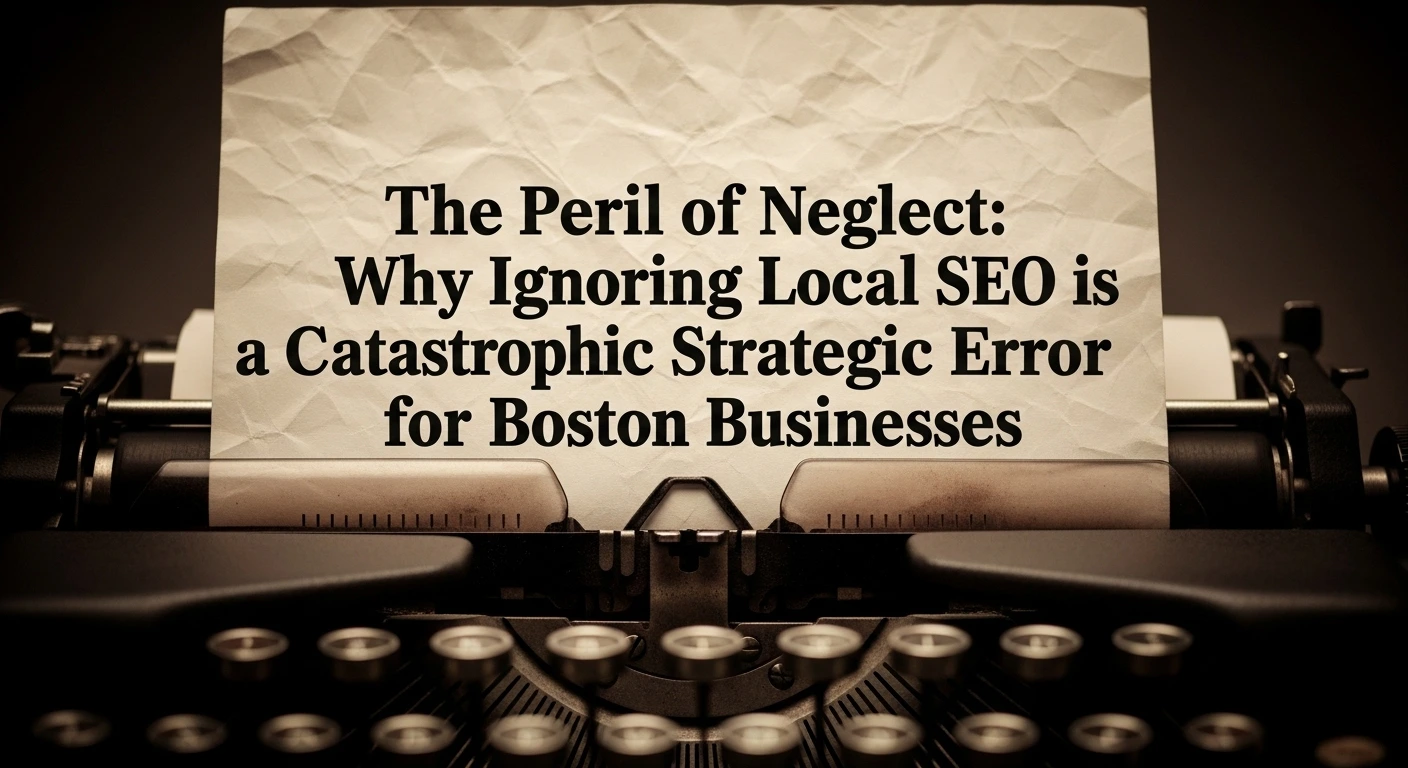
In Boston’s intensely competitive market, where every business vies for attention and consumer behavior is shifting, neglecting your local SEO is not merely a missed opportunity; it’s a strategic blunder with severe, measurable consequences. It’s like having a prime retail space on Newbury Street but keeping the lights off, the doors locked, and no sign out front.
The Invisible Business: Disappearing in a Crowded Market
The most immediate and devastating consequence of poor local SEO is simple: your business becomes invisible. When a potential customer searches for “dog groomer South End” or “financial advisor Back Bay,” and your business doesn’t appear prominently in the local pack or relevant search results, you’ve effectively handed that customer directly to a competitor. In a city where over 45% of all Google searches have local intent, this represents a massive, ongoing loss of potential revenue that your competitors are eagerly capturing.
Consider the typical Bostonian’s search behavior. They’re often on the go, making quick decisions based on immediate information. If your business doesn’t surface within the first few results, especially on mobile, it might as well not exist. The opportunity cost — the business you lose to competitors who *are* optimizing — is substantial and grows every day. In fact, about 68% of online searchers prefer to click on a local 3-pack, meaning if you’re not there, you’re largely out of sight.
The Erosion of Trust and Credibility: A Digital Red Flag
Nothing undermines customer trust faster than inconsistent or outdated information. Imagine a potential client looking for your Boston business, finding conflicting operating hours on your GBP versus your website, or seeing an old address listed on a third-party directory. This digital disarray immediately raises red flags for both potential customers and Google’s algorithms.
Studies confirm this: 63% of users won’t contact a business with inaccurate listings, and a startling 73% lose confidence in brands with inconsistent information across the web. For Boston businesses, where reputation and word-of-mouth (both online and offline) are vital, this erosion of trust is a death knell. Google actively penalizes inconsistencies (known as NAP – Name, Address, Phone – inconsistency) in its effort to provide reliable results, making it harder for your business to rank and significantly diminishing your perceived E-E-A-T (Experience, Expertise, Authoritativeness, Trustworthiness) — core principles Google meticulously evaluates.
Furthermore, a sparse or unmanaged Google Business Profile, lacking photos, recent reviews, or regular updates, signals to both Google and potential customers that your business may be inactive, unprofessional, or simply not trustworthy. In a high-stakes, competitive market like Boston, this immediately puts you at a severe disadvantage, as customers will gravitate towards more active and credible online presences.
The Illusion of Outreach: Wasted Marketing Spend
Many Boston businesses invest heavily in traditional advertising: billboards along I-93, radio spots on local stations, ads in community newspapers, or even broader digital branding campaigns. These efforts are designed to build awareness and drive potential customers to seek you out. But if those efforts culminate in a digital search where your business is invisible or presents inaccurate information, that initial marketing spend becomes largely inefficient, a leaky bucket that drains your budget without delivering qualified leads.
Local SEO acts as the vital bridge, ensuring that every dollar spent on brand building or awareness campaigns isn’t wasted at the crucial point of conversion. It ensures that when a potential customer, prompted by your other marketing efforts, decides to “Google” you, they find a clear, compelling, and accurate digital pathway directly to your door, your phone, or your website. It maximizes the ROI of all your marketing endeavors by ensuring discoverability where it matters most.
The Shifting Foot Traffic Myth: Reclaiming Your Local Audience
While the Massachusetts Taxpayers Foundation’s data on reduced downtown foot traffic is sobering, it’s crucial not to misinterpret it as an overall decline in local commerce. Instead, it signifies a **redistribution of activity** within the greater Boston area. As fewer people commute into the city’s central business districts, more life and work are now concentrated within Boston’s vibrant neighborhoods and surrounding communities.
The mistake is assuming your business’s success is tied solely to outdated foot traffic patterns. The immense opportunity lies in adapting your digital strategy to capture this *shifted* local demand. A restaurant in the Financial District, for instance, might now need to intensify its local SEO efforts to attract the growing residential population and evening/weekend visitors, rather than solely relying on weekday office workers. Similarly, a boutique in Coolidge Corner or a service provider in West Roxbury can leverage hyper-local SEO to become the go-to destination for residents within a few blocks, even if fewer people are passing by their storefront on their way to work.
Local SEO provides the tools to pivot effectively. It enables you to actively target customers in Jamaica Plain, capture demand in Roslindale, or dominate searches within the commuter rail towns where many Boston workers now spend their hybrid workdays. It’s about meeting your audience precisely where they are, not simply where they used to be, ensuring your business’s continued relevance and profitability in an evolving urban landscape.
—
The Tangible ROI: Local Search as a Revenue Engine for Boston Businesses
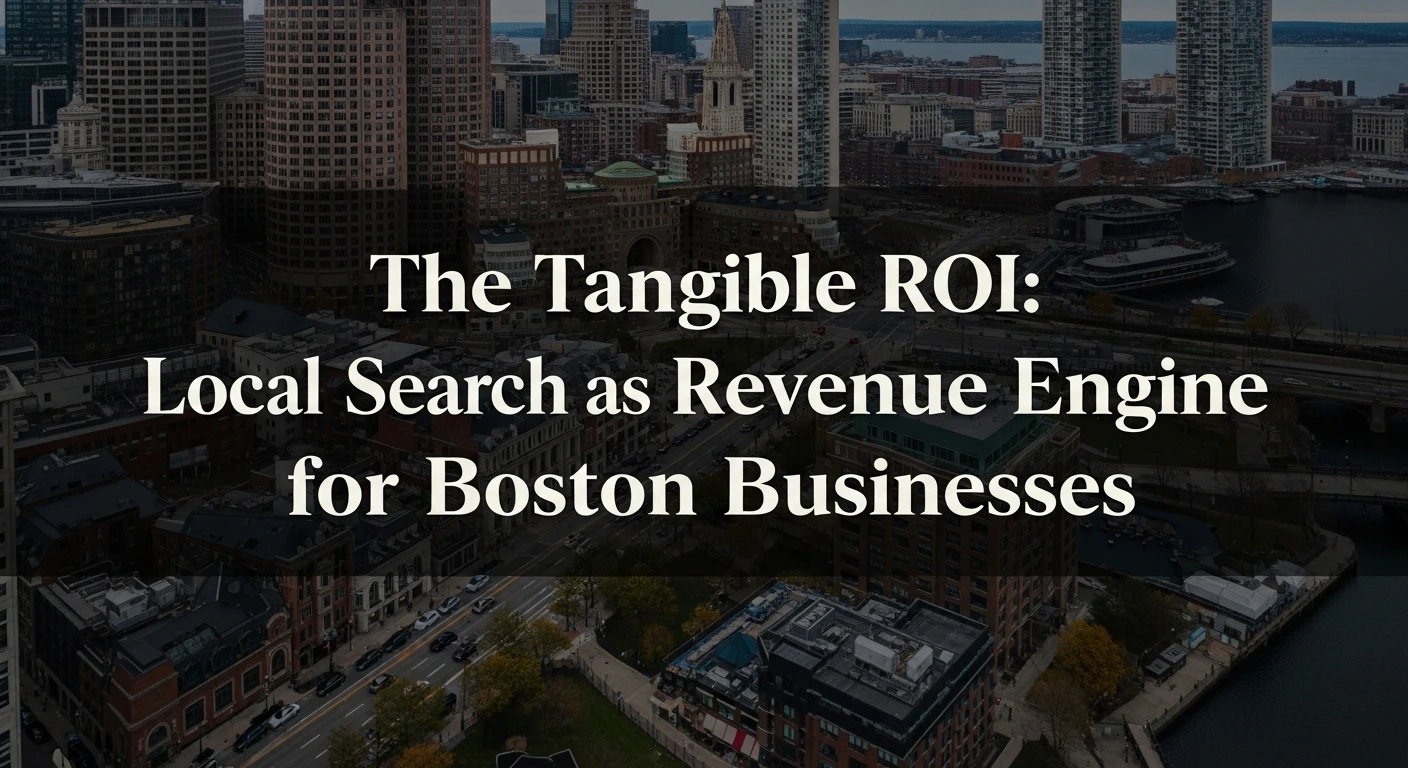
For the results-oriented Boston business owner, the most compelling argument for local search isn’t theoretical; it’s the undeniable, measurable return on investment. Local SEO isn’t just about passive visibility; it’s about actively driving conversions and generating tangible revenue for your business.
High-Intent, High-Value Leads: Beyond the Broad Funnel
Local search queries represent the pinnacle of customer intent. When someone searches for “urgent plumbing repair Charlestown” or “best takeout restaurant near TD Garden,” they’re not merely Browse or conducting initial research; they’re expressing an explicit, immediate need and are typically at the very bottom of the sales funnel, ready to make a decision or a purchase. This direct intent translates into significantly higher conversion rates, meaning the leads generated through local SEO are not just abundant, but also exceptionally qualified and much closer to a purchasing decision.
Consider the powerful conversion statistics that underpin this value: 76% of people who search for something nearby on their smartphone visit a business within the same day, and a significant 28% of those searches result in a purchase. For mobile local searches specifically, an impressive 78% ultimately lead to an offline purchase. These aren’t just clicks; they’re direct phone calls, in-store visits, and immediate revenue for your Boston business, underscoring the invaluable nature of highly targeted local search traffic compared to broader, less intent-driven marketing channels.
Measurable Conversions from Your Google Business Profile
Your Google Business Profile isn’t just a digital sign; it’s an interactive dashboard of direct customer engagement and a powerful analytics tool. Google provides detailed GBP Insights that allow you to track real, tangible actions that directly correlate with your business’s success:
- Calls: The precise number of direct phone calls initiated by customers from your GBP listing. Implementing dedicated call tracking numbers can further refine this data, allowing you to attribute specific campaigns or GBP optimizations to direct phone leads.
- Direction Requests: The exact number of times users requested directions to your physical location, a direct, undeniable indicator of increased foot traffic and in-store visits.
- Website Clicks: The volume of engaged users who clicked through to your website from your GBP, ready to explore your services, view your menu, or make an online purchase.
- Messages/Bookings: With Google’s enhanced messaging features (including WhatsApp integration), you can track direct customer inquiries and booking requests made straight from your profile, providing a direct line to conversion.
These aren’t abstract impressions or vague engagement metrics. They are quantifiable actions that directly contribute to your bottom line. Verified businesses on Google Maps garner an average of 21,643 views annually. Each view is an opportunity, and the actions taken from those views are direct, measurable conversions. Furthermore, businesses that actively utilize all available GBP features (products, services, specific attributes) see 36% higher engagement rates, further underscoring the profound ROI of comprehensive optimization. This data empowers you to make informed decisions and refine your local SEO strategy for maximum impact.
The Cost-Effectiveness Advantage, Especially in Uncertainty
In an economic climate where Boston businesses are “navigating rising uncertainty”, where profits are trending negative for many (NFIB Small Business Optimism Index, May 2025), and where “taxes” have even surpassed inflation as the top problem for small businesses, every marketing dollar must work harder and smarter. Local SEO shines here as a highly targeted, efficient, and often more cost-effective way to acquire customers compared to broader, less targeted advertising campaigns.
By focusing your efforts on customers actively searching for your services or products in your immediate geographic area, you minimize wasted spend and maximize efficiency. It’s about precision marketing, ensuring your budget is directed towards the most likely converters. This efficiency is crucial for small and medium-sized Boston businesses operating with tighter margins and a greater need for immediate, measurable returns. It offers a path to steady, organic growth without requiring massive, risky upfront ad spends.
Enhancing Customer Lifetime Value (CLTV) and Community Trust
The benefits of local SEO extend far beyond initial conversions. By consistently providing accurate information, actively engaging with reviews, and maintaining a strong local presence, your business builds profound trust and credibility within its community. This trust fosters invaluable customer loyalty, encouraging repeat business and valuable word-of-mouth referrals – a cornerstone of sustainable growth in Boston’s tight-knit neighborhoods, where community ties often run deep.
A positive local online reputation, driven by excellent reviews and responsive engagement, transforms one-time customers into genuine brand advocates. 98% of people read online reviews at least occasionally before deciding on a local business, and businesses with 4+ star ratings see up to 30% higher conversion rates. Furthermore, 91% of consumers say that reviews for local branches influence their overall opinion of larger brands. This directly contributes to higher customer lifetime value, ensuring sustainable growth long after the initial local search, making your business a fixture in its Boston community.
—
Laying the Groundwork: Fundamental Pillars of Boston Local Search Success
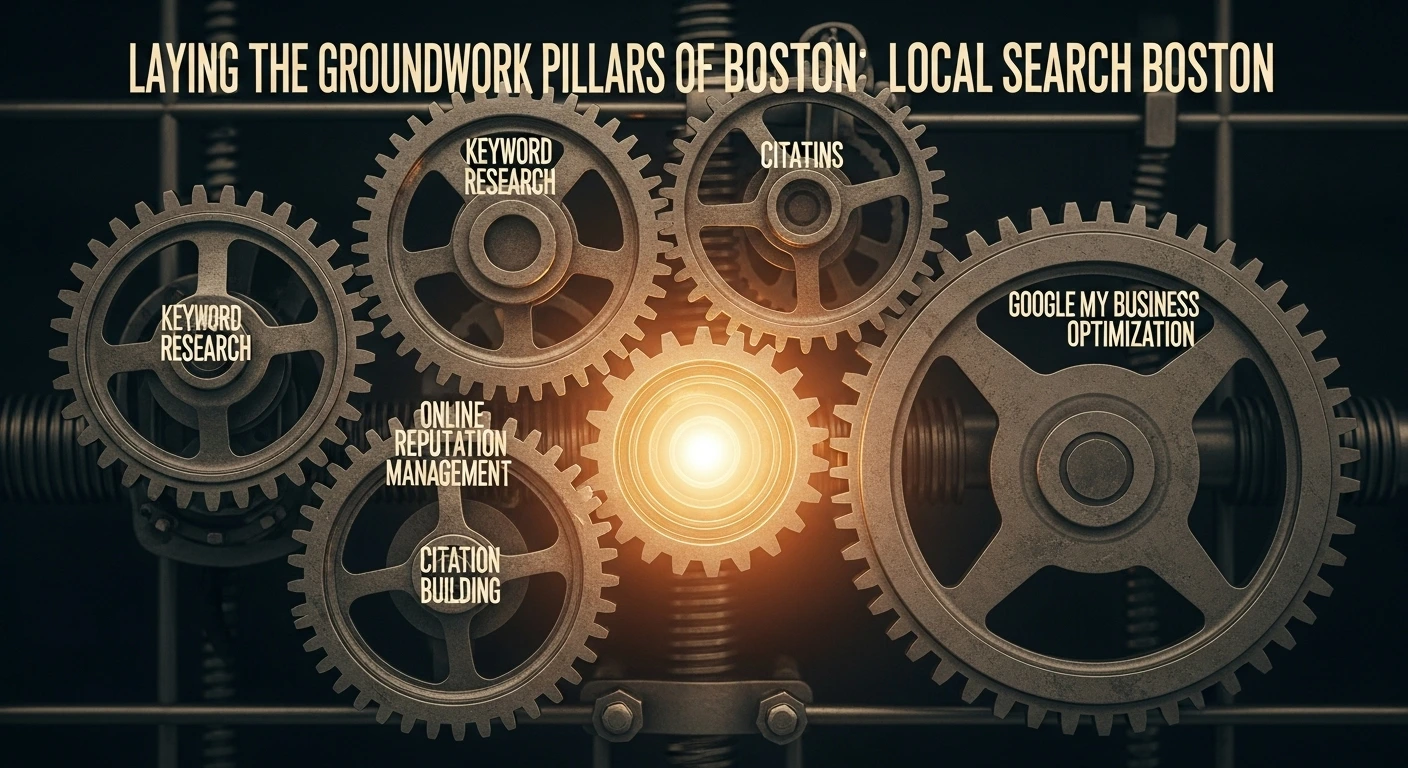
To truly dominate local search in Boston’s evolving market, a multi-faceted, strategic approach is required. It’s about meticulously building a robust digital foundation that Google can trust and that customers can easily navigate. While each of these pillars will be explored in greater depth in subsequent posts in this series, it’s vital to understand their interconnected importance as you begin to formulate your local SEO strategy.
A. The Primacy of Google Business Profile Optimization: Your Central Command
As repeatedly emphasized, your Google Business Profile is the absolute core of your local SEO strategy. Its proper, continuous optimization is non-negotiable for maximizing visibility in Google Maps and local search results. This involves far more than just claiming your listing; it requires meticulous attention to detail and ongoing management:
- Complete and Accurate Information: Every single field within your GBP dashboard must be filled out accurately and kept scrupulously up-to-date. This includes your precise business name (avoid keyword stuffing in the name, as Google is cracking down), physical address, phone number, website URL, and detailed hours of operation (including holiday hours). Inaccurate information is a major trust signal for Google and a frustrating experience for users.
- Precise Categorization: This is critically important for discoverability. Select the most relevant primary category that accurately defines your core business, then add as many secondary categories as apply. For instance, a bakery might be “Bakery” (primary) but also “Coffee Shop” or “Dessert Shop.” Google uses these categories to match your business with relevant searches, directly impacting who sees your listing.
- Visual Richness: The Storytelling Power of Imagery. High-quality, geo-tagged photos and videos are no longer optional extras; they are powerful ranking and engagement factors. Upload clear, professional images of your storefront (exterior, interior), your team, your products or services in action, and even behind-the-scenes glimpses. Google actively promotes listings with rich visual content, including new features like Instagram/TikTok-style “Story format” reviews. Businesses that leverage professional 360° virtual tours see significantly higher engagement and better local pack visibility. Remember, people often make decisions based on what they see before they even read.
- Services/Products Listings: Capture Specific Intent. Utilize the Services or Products section within your GBP to list all your offerings in detail. This allows you to capture specific, long-tail search queries (e.g., “gluten-free pastries Boston,” “small business tax preparation Seaport,” “emergency drain cleaning services Charlestown”). Google is now leveraging AI tools to help businesses generate menus and product lists directly from uploaded photos or text, highlighting their increasing importance for search matching.
- Active Management & Engagement: Google rewards active, well-maintained profiles. Regularly utilize GBP Posts for special offers, upcoming events (e.g., a community clean-up in Jamaica Plain, a book signing in Beacon Hill), company updates, or new product launches. Respond promptly to customer messages and inquiries received through GBP, including the new WhatsApp integration options. Google now cross-checks GBP updates with local events, meaning genuine community involvement and fresh content can directly boost rankings.
This meticulous attention to your Google Business Profile will be the absolute cornerstone of your local digital presence, setting the stage for all other local SEO efforts. (This will be the sole focus of our next deep dive: Your Digital Storefront: Optimizing Your Google Business Profile for Boston Domination, providing a step-by-step guide to mastering this critical platform.)
B. NAP Consistency Across the Digital Landscape: The Foundation of Trust
NAP stands for Name, Address, Phone Number. This seemingly simple detail is, in fact, a foundational element of local SEO, yet it’s surprisingly often overlooked. Google’s algorithm rigorously cross-references your NAP information across the entire web – on your website, Google Business Profile, social media profiles (Facebook, Instagram, LinkedIn), and hundreds of third-party directories (Yelp, TripAdvisor, Apple Maps, Yellow Pages, industry-specific listings, local chambers of commerce, etc.).
Any inconsistencies – even minor ones like abbreviations (e.g., “Street” vs. “St.”) or slight variations in your phone number format – can confuse search engines. When Google encounters conflicting information, it becomes less confident in your business’s legitimacy, which can negatively impact your rankings. Furthermore, such inconsistencies directly frustrate potential customers who might try to call an old number or visit an incorrect address, leading to lost business and eroded trust.
Maintaining meticulous NAP consistency across all digital touchpoints is crucial for building Google’s confidence in your business’s legitimacy and for ensuring customers always find the correct contact details and location. Think of it as your consistent, verifiable digital fingerprint across Boston’s vast online landscape. Automated tools exist to help audit and correct these citations, which is a critical first step for any Boston business serious about local search.
C. The Indispensable Role of Online Reviews and Reputation Management
Online reviews are more than just feedback; they are the new word-of-mouth in the digital age, acting as a powerful form of social proof and a critical factor in decision-making for discerning Bostonians. 98% of people read online reviews at least occasionally before deciding on a local business, and 36% specifically check Google reviews to guide their purchase decisions. Businesses with 4+ star ratings see up to 30% higher conversion rates, while a majority of consumers won’t even consider a business with ratings below 3 stars.
Google considers review quantity, quality, recency, and diversity as crucial local ranking factors. An active, positive review profile signals trustworthiness and popularity. A proactive review strategy involves:
- Systematically Soliciting Reviews: Implementing clear, ethical processes to encourage satisfied customers to leave reviews on Google, Yelp, and other relevant industry-specific platforms. This can be done via follow-up emails, in-store signage, or direct requests after a positive interaction.
- Responsive Management: Actively monitoring and responding to *all* reviews, both positive and negative. Responding to positive reviews reinforces customer loyalty, while professionally and empathetically addressing negative feedback can turn a potentially damaging situation into a positive demonstration of customer commitment and transparency. Google’s new emoji reactions for reviews also offer a new layer of engagement.
- Leveraging Review Schema: Implementing schema markup for reviews on your website helps search engines better understand and display your review content, potentially leading to rich snippets in search results.
Ignoring your online reputation means ignoring a massive trust signal for both search engines and potential customers. (This vital topic will be thoroughly covered in Post 5: Beyond Yelp: Cultivating a Five-Star Reputation with Boston Customer Reviews, providing a detailed roadmap for mastering your online reputation in Boston.)
D. Localized Content: Speaking Directly to Bostonians with Authenticity
To truly resonate with your target audience and stand out, your website content must reflect a deep, authentic understanding of Boston and its unique culture, challenges, and opportunities. This goes far beyond just adding “Boston” or a neighborhood name to your keywords; it’s about crafting content that genuinely speaks to local interests, events, landmarks, and shared experiences specific to the city’s diverse communities.
- Hyper-Local Blog Posts: Create articles that offer genuine value to Boston residents. Examples: “Best Dog Parks in Cambridge for Your Furry Friend,” “Navigating Public Transit for Patients in the Longwood Medical Area,” “Hidden Gems for Lunch in the Financial District,” “Top Family-Friendly Activities in Dorchester,” or “Where to Find the Best Live Music Venues in Allston-Brighton.” This kind of specific, helpful content not only attracts the right audience but also signals to Google your deep relevance within the Boston geographic context. Highly localized content can double organic traffic from local searches.
- Service Area Pages: If your business serves multiple neighborhoods or towns within Greater Boston but doesn’t have a physical location in each, creating dedicated, optimized service area pages for each is crucial. These pages should detail the specific services offered in that area, highlight local testimonials, and use relevant local keywords to tell Google exactly where you operate and help you rank for location-specific searches outside your immediate physical address.
- Community Connection and Storytelling: Demonstrate your genuine involvement in local events, sponsorships, or charities. Content that showcases your business’s authentic ties to the Boston community, such as supporting a local youth sports team or participating in a neighborhood clean-up, generates 47% more engagement than generic local content. These narratives build trust and resonate deeply with local customers, reinforcing your E-E-A-T signals.
- E-E-A-T and Originality: In an era of increasing AI-generated content, Google is prioritizing content that demonstrates real-world Experience, Expertise, Authoritativeness, and Trustworthiness. This means sharing original research, unique insights, genuine photos, and personal stories. For a Boston business, this means showcasing your team’s local knowledge, specific Boston case studies, and a distinct brand voice that speaks authentically to the Boston experience. Google’s Helpful Content System, now integrated into its core algorithm, heavily favors content created for people, by people, with genuine value.
E. Local Link Building: Earning Community Authority & Digital Trust
While traditional backlinks remain important for overall SEO, local SEO places a premium on *local* links. These are backlinks from other reputable Boston-based businesses, community organizations, local news outlets, and relevant industry associations. These links act as powerful “votes of confidence” from within your community, signaling to Google your local authority, relevance, and trustworthiness.
Strategies for acquiring high-quality, locally relevant links, often called “citations,” include:
- Collaborating with Complementary Businesses: Partnering with non-competing local businesses for cross-promotions, joint events, or shared blog content. For example, a local gym could partner with a healthy meal prep service for a joint workshop, leading to mutual website mentions and links.
- Sponsoring Local Events: Becoming a sponsor for a charity run in the Back Bay, a community festival in the North End, a youth sports league in West Roxbury, or a university event in Cambridge provides valuable local visibility and often leads to mentions and links on event websites or local news coverage.
- Joining Local Organizations: Becoming an active member of the Greater Boston Chamber of Commerce, neighborhood business associations, or industry-specific local groups. Many of these organizations offer valuable member directories with authoritative links to your website.
- Local PR and Media Outreach: Engaging with local newspapers (e.g., Boston Globe, Boston Herald), online Boston-specific blogs, community news sites, or local TV/radio stations for features, mentions, or expert commentary. Being a go-to source for local insights builds significant authority.
- Unstructured Citations: These are mentions of your business on local blogs, news articles, or online forums that don’t necessarily include a direct link but still signal your presence and relevance to Google. Actively participating in online local conversations can lead to these valuable mentions.
These efforts not only boost your SEO by strengthening your digital authority but also reinforce your real-world ties within the Boston community, fostering relationships that can lead to both digital growth and tangible business opportunities. (We’ll explore this further in Post 6: Local Link Building for Boston: Earning Authority and Credibility in Your Community, providing a detailed strategy for earning valuable local authority).
—
Looking Ahead: Future-Proofing Your Boston Local Search Strategy for the Next Decade

The digital landscape is a constantly evolving entity, and local search is no exception. For Boston businesses committed to long-term success, merely adapting to current trends isn’t enough; future-proofing your strategy means understanding and proactively preparing for the next wave of advancements in how customers search and how Google ranks.
A. The Accelerating Role of AI in Local Search: From Information Retrieval to Decision Engines
Artificial Intelligence is no longer a futuristic concept; it’s actively transforming how Google understands, processes, and presents local information. Google’s Search Generative Experience (SGE), powered by generative AI, is expanding globally and aims to provide more comprehensive, conversational, and hyper-tailored search results. For local businesses, this profound shift brings several critical implications:
- Contextual Relevance & Prediction: AI is enhancing Google’s ability to understand user intent with unprecedented precision, factoring in real-time location, time of day, past user behavior, and even preferences across multiple interactions. This means Google won’t just match keywords; it will predict what a user *really* needs. Your GBP’s completeness, accuracy, and active engagement become even more critical, as Google leverages these signals to gauge your deep relevance and trustworthiness in complex scenarios.
- Direct Answers & AI Overviews: AI is further fueling the “zero-click” trend by synthesizing information from multiple sources to provide direct answers and recommendations within the search results, often in the form of AI Overviews. This fundamentally alters the traditional “10 blue links” paradigm. Your content, especially your GBP and well-structured website content, needs to be optimized for these direct answers, ensuring Google’s AI can easily extract and present your information. The goal is to become an “information building block” for AI responses.
- AI-Assisted Content Optimization: While Google’s helpful content updates emphasize human-first content, AI tools can become powerful allies in content optimization. They can assist with in-depth keyword research, topic clustering to demonstrate comprehensive expertise, on-page SEO elements (meta tags, schema markup), and even identifying content gaps. However, Google’s stance on AI-generated content remains clear: it’s not prohibited, but it *must* be “helpful, original, and user-focused,” with human oversight crucial for maintaining E-E-A-T.
- Hyper-Specialization Over Generalism: As AI Overviews become the default for many searches, generalist websites that offer surface-level information may see reduced visibility. Google’s AI will favor highly specialized, authoritative content from businesses that demonstrate deep expertise in a niche. For Boston businesses, this means doubling down on your specific area of expertise (e.g., “South End historic home renovations,” “biotech legal counsel,” “North End artisanal pasta”), becoming the definitive source for that niche.
B. The Continued Rise of Voice Search and Conversational Interfaces
Voice search, deeply intertwined with AI, will only grow in prominence as smart speakers, mobile assistants, and in-car systems become ubiquitous. Bostonians will increasingly use natural language queries, expecting immediate, relevant results:
- Conversational Keyword Optimization: Your content must be optimized for how people *speak* their questions, rather than just type them. This means focusing on longer, more natural phrases like “What’s the best bakery in the North End open now?” or “Where’s the nearest pharmacy on Newbury Street that accepts my insurance?”
- Structured Data (Schema Markup): Implementing comprehensive schema markup (using JSON-LD) on your website helps search engines better understand your content’s context and meaning. This makes it easier for AI to extract precise answers for voice queries and can lead to valuable rich snippets in search results.
- Direct Answer Focus: Ensure your GBP and website content provides concise, direct answers to common questions about your business, products, or services. Voice search thrives on brevity and immediate utility.
C. The Visual Search Revolution and Immersive Experiences
The power of visuals in local search is undeniable and growing. Google is constantly enhancing its visual search capabilities, and businesses that prioritize rich media will gain a significant competitive edge:
- High-Quality Imagery: Google continues to prioritize stunning, accurate photos. New strict guidelines on photo quality and relevance will emerge, alongside the expectation for fresh, regularly updated visuals on your GBP and website.
- Video Content: Short, engaging videos on your GBP, website, and social media can significantly boost engagement and provide a more immersive preview of your business. Think quick tours, product demonstrations, or behind-the-scenes glimpses of your team at work in Boston.
- 360° Virtual Tours: Immersive experiences like Google Street View-compatible virtual tours are becoming increasingly important for showcasing your physical location. They allow potential customers to virtually explore your Boston storefront, restaurant, or office, significantly boosting engagement, building trust, and driving in-person visits. Businesses with virtual tours see higher engagement and better local pack visibility.
D. Hyper-Personalization and the E-E-A-T Evolution
As Google’s algorithms become more sophisticated, local search results will become even more tailored to individual user behavior, location history, and preferences. This makes demonstrating strong E-E-A-T (Experience, Expertise, Authoritativeness, Trustworthiness) more critical than ever:
- User Signals: Reviews, clicks, dwell time on your GBP and website, and conversions will become even more influential signals. Google will learn from how users interact with your business.
- Contextual Awareness: Google will consider not just *what* you search for, but *where you are*, *what time it is*, and *what your past behaviors indicate* you might need. A “restaurant near me” search at lunchtime will yield different results than a late-night query.
- The Human Element of E-E-A-T: With the rise of AI, Google is increasingly emphasizing original, human-generated content that showcases genuine experience (E). This means sharing your unique insights, Boston-specific case studies, and the real stories of your business and its impact on the local community. Transparent author attribution, credible sourcing, and a clear “About Us” page that highlights your team’s expertise are vital for trustworthiness.
- Local Entity Optimization: Google is increasingly understanding businesses as “entities” rather than just keywords. Ensuring your business is recognized as a legitimate, authoritative entity within its specific local context (e.g., “The best seafood restaurant in the North End” is an entity, not just a string of keywords) will be key.
—
Conclusion: Seizing the Local Search Advantage in Boston’s Evolving Market
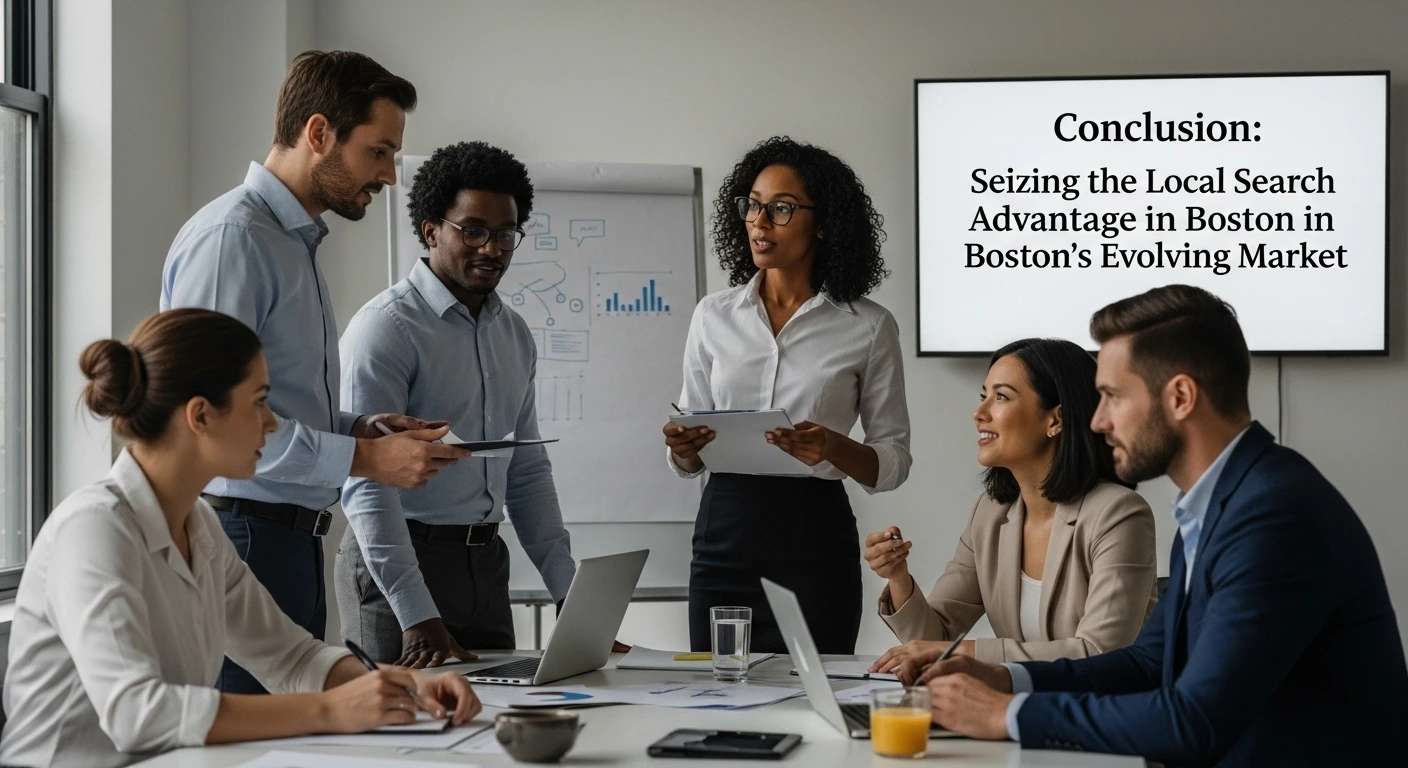
The winds of change are undeniably blowing through Boston’s economic and commercial landscape in 2025. From shifting consumer caution to the lasting impact of remote work, businesses are facing a new reality that demands strategic adaptation. Yet, within this evolution lies an immense opportunity for those willing to innovate, embrace digital transformation, and strategically leverage the unparalleled power of local search.
Local SEO is no longer a peripheral marketing concern; it is the fundamental engine that connects your Boston business with its most valuable asset: the local customer actively searching for your products and services. By meticulously optimizing your Google Business Profile, ensuring NAP consistency across the digital sphere, cultivating a sterling online reputation, crafting compelling localized content that resonates with Bostonians, and building genuine community-based links, you are not merely adapting — you are dominating. You are building a digital presence that is resilient, highly visible, and capable of driving consistent, qualified customer engagement and revenue, even in uncertain times.
This deep dive has laid the essential groundwork, revealing the critical “why” and hinting at the comprehensive “how” of this indispensable strategy. But this is just the beginning. The journey to local search mastery is multifaceted and ongoing, and we are here to guide you every step of the way, ensuring your Boston business is not just found, but chosen, trusted, and thriving.
Are you ready to transform these insights into actionable results and secure your Boston business’s digital future? For those seeking to accelerate their growth and ensure their local search strategy is robust, resilient, and future-proof, don’t wait. We invite you to connect with the experts at seobostonma.com to explore our Boston Local SEO Services, or simply schedule a free consultation with our team today. Let us show you how a strategic partnership can unlock the full potential of local search for your unique business, ensuring you not only navigate the shifting tides but truly flourish.

